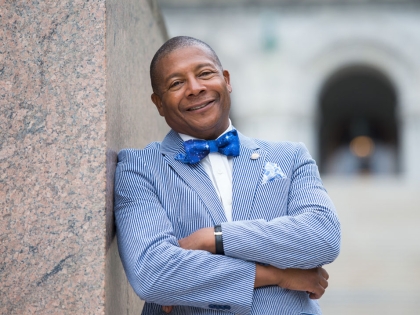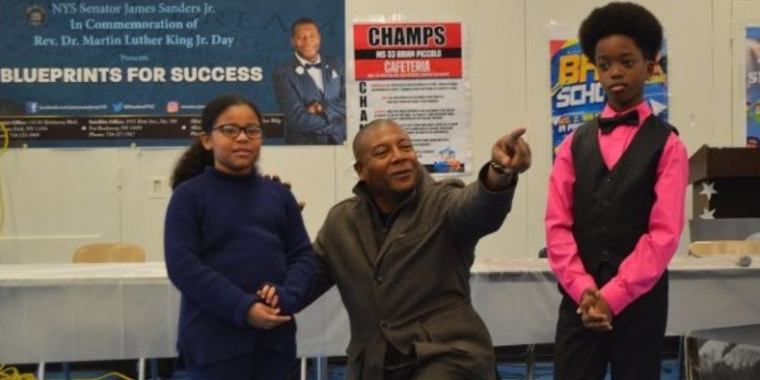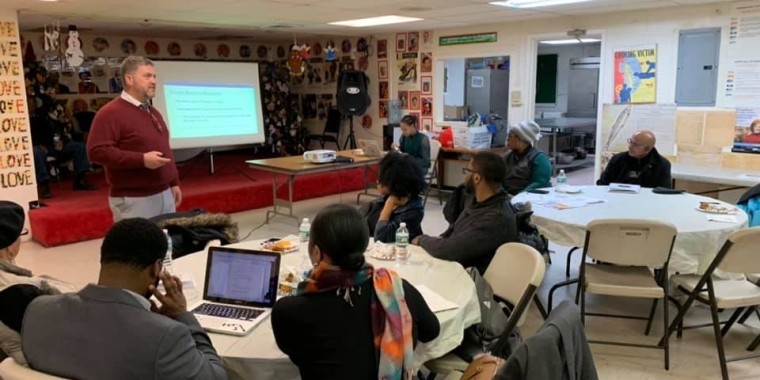
Sanders Commemorates the 150th Anniversary of the Abolition of Slavery
December 9, 2015

In commemoration of the 150th anniversary of the abolition of slavery, State Senator James Sanders Jr. (D-Rochdale Village) hosted a thought provoking panel discussion at the Black Spectrum Theatre on Wednesday night, pondering questions of whether slavery has truly been abolished and discussing forms of modern day slavery.
"History is critical, but I don't have to tell that to the folk in this room because you have come here hungry for knowledge," Senator Sanders said. "Some people say they don't like history, but that is because they don't understand their place in it. Every day we make history."
Panelists featured at the event were: Dr. Kellie Carter Jackson, professor of history at Hunter College, Shoshana Brown of the New York State Justice Network, Dr. Deirdre Cooper Owens, assistant professor of history at Queens College, Dr. Michael Namphy, assistant professor of history at York College, and Anthony Benson of Black Veterans for Social Justice.
As we look back on the 150 years since the passage of the 13th Amendment, which abolished slavery and involuntary servitude, except as punishment for a crime, we must not forget that abolition really began two years earlier when President Abraham Lincoln issued the Emancipation Proclamation, which declared "that all persons held as slaves" within the rebellious states "are, and henceforward shall be free."
Dr. Kellie Carter Jackson, professor of history at Hunter College, called the Emancipation Proclamation, "one of the greatest documents to ever exist in American history,” noting that the document freed 3.1 million out of 4 million enslaved Americans. However, Lincoln did not provide a way for the former slaves to get to the north, but despite this fact, African-Americans took the initiative and started leaving in the hundreds of thousands, demonstrating how they essentially freed themselves.
In addition to emancipation, for the first time ever black men were able to enlist in the military and legitimately and legally kill their former slave owners, in what basically amounted to state sanctioned rebellion. About 250,000 black troops fought in the Civil War and Lincoln credited them for turning the tide and helping the north win the battle.
“It was never inevitable that the North would have won the war,” Jackson said. “In history we say nothing in inevitable. The fact that these men joined also changes the tone of the war. “Instead of having a war in which we are fighting to bring the South back into the union, now we have a war to end slavery. If anyone tells you that the Civil War is not about slavery, they’re lying to you. It’s not about state’s rights, unless you are talking about state’s rights over slavery. It’s not about taxes, unless you are talking about taxes over slavery. This is all an issue of slavery.”
Jackson noted that by the time the 13th Amendment was passed, it was really just a formality, and only freed a few thousand people. The states of Maryland, Kentucky, Tennessee, West Virginia, Missouri, Louisiana had already freed their slaves before the 13th Amendment even passed, because they saw the writing on the wall and knew slavery was dead. “So you could say the Emancipation Proclamation was the murder of slavery and the 13thAmendment is the medical examiner who comes in and announces the time of death – 1865.”
Shoshana Brown of the New York State Justice Network noted that slavery did not end after the Civil War, citing examples such as convict leasing, a system in which armies of free men were repeatedly bought and sold, forced to work for no pay, and do the bidding of white masters. She also recalled the Jim Crow era, which perpetuated inequality and disenfranchisement through the idea of separate but equal.
Brown explained that there is also modern day slavery, though it looks different than that of previous eras. “It’s shape-shifting every second, and we have to be able to track it,” she said. “Slavery still exists as a punishment for crime. That was not outlawed by the 13th Amendment.”
Brown pointed to the present day system of mass incarceration as an example. In New York State, there are 56,000 people in prisons, she said, and 30,000 in jails. Then there are those who have been confined to psychiatric institutions by civil courts.
“We are talking about a lot of people that mostly come from black and brown communities,” Brown said. “They are taken away from their homes, moved upstate where they are hard to reach and isolated, and there are consequences to this cycle. There is a huge amount of police repression, and we can see a continuum from slavery all the way to today, with stop and frisk and the revolving door criminal justice system.”
However, there is also modern day resistance to modern day slavery, according to Brown, including legislation like the Safe Parole Act, which Senator Sanders has co-sponsored. It aims to reform parole board hearings to prevent applicants from being routinely denied release from jail based solely on the nature of their crime. Other ways to stop so-called mass incarceration slavery, Brown said, is to restore funding for education in prison so that inmates can be rehabilitated. She added that elderly people who are in prison and pose little risk of re-offending should be released, because they are costing tax payers money with their increased need for medical care.
“This is not just a human rights issue, it’s also an economic issue, and we need to look at those things and redirect and shift the way we respond to violence,” Brown said. “This is not about letting everybody go, it is about fairness and justice, and allowing people to rehabilitate themselves including youth and the elderly and examining how the system works internally.”
Dr. Deirdre Cooper Owens, assistant professor of history at Queens College, spoke about how the 13th amendment is still being referenced today in cases of modern day slavery as it relates to the criminal justice system, and used the example of Finbar McGarry, a graduate student who had been detained at a correctional facility in Vermont.
McGarry was brought up on charges related to a domestic disturbance, but had not yet been convicted. For six weeks he was forced to work in the prison laundry for 25 cents an hour, or face solitary confinement. While there, he contracted a bacterial infection. After the charges were dropped and he was released, he sued Vermont and the correctional facility, claiming they had violated his 13th Amendment rights. The court ruled against him. His lawyer appealed and the case is ongoing.
“This should be interesting because there is enough evidence to show that involuntary servitude should also be based on one’s innocence,” Cooper Owens said. “Sometimes we look at documents like 13th Amendment, and we don’t see them as not being applicable to our lives, but they are right before us and the knowledge is always there.”
Dr. Michael Namphy, assistant professor of history at York College, pondered what it means to be free. He said the reason so many people talk about freedom is because it’s something that so few people possess, like courage.
“We all like to believe that we are free and it is painful to admit that we aren’t,” Namphy said. “If we were really a free people and all of us acted like it, then we would not be in this mess we are in today. We would not allow the kind of insult and exploitation that is a daily part of all of our lives.”
Namphy said there are many historical examples of people living free, but sadly it often ended with their deaths, such as in the cases of the Rev. Dr. Martin Luther King Jr., Malcolm X, Medgar Evers, President John F. Kennedy, John Brown, James Chaney, Andrew Goodman, and Michael Schwerner. The list goes on and on.
“The prophetic tradition in many religions is full of people who died for a principle higher than themselves,” Namphy said. “To me, that is the look of freedom.”
He also cited the Haitian Revolution of the 1790s as a singular moment in history, a time when an army of enslaved Africans threw out their enslavers, and stated that it remains an iconic example for oppressed people, giving them hope that freedom is possible. However, it came with consequences.
“Look at Haiti now,” Namphy said. “Haiti just might be the poorest country in the world. Do you think there is a connection? Of course there is. The French and Americans have brutally punished Haiti for the unforgivable sin of decisively opposing white slave masters, and they did that because what Haiti showed the black world is that it can be done. We could be free.”
Speaking to the youth in attendance at the event, Anthony Benson of Black Veterans For Social Justice, encouraged them to study their history, get an education and stay out of the prison system. He cited a study by UCLA that stated an alarming amount of pre-schoolers are being suspended from school. He noted the differences between public and private prisons, explaining that inmates in for-profit prisons usually serve two to three months more than those in public prisons, according to studies by the University of Wisconsin. “They are banking on you to fail,” he said. “To the prisons you equal dollar signs.”
Benson also spoke about an eye-opening experience he had when he left Southeast Queens, where he grew up, to attend a predominantly white university in Pennsylvania. “It was culture shock,” he said. “It was a really rural town. I went into a convenience store and blatantly on the counter were cards stating that the gentleman who owned the store was a member of the KKK.”
He said that experience along with racism he encountered during his college years showed him that the world was bigger than his home borough. He said that it is important for youth to get out of the inner cities and travel to really learn by interacting with different people, so they are prepared for various situations. “The reason we still have a form of slavery now is because our mental mindset is not thinking about the big picture,” Benson said. “We only think about here and now.”
Share this Article or Press Release
Newsroom
Go to Newsroom

